

As an experienced management consultant focused on Go-To-Customer innovation and the evolving need to delight the customer, I have spent the past 25 years focused on developing strategy and operational methodologies and techniques to drive differentiation via innovation in business outcomes through technology enabled business process change.
With roles as an industry leading management consultant, product manager for a large multi-national technology vendor, and from 2004 - 2008 as the CEO of a $50M per annum System Integrator, I have experienced all elements of business management from operational, to strategic and can empathise with and work at any level within an organistion from the board to the guys and gals at the front line of customer interaction.
I love change and I love helping organisations change to create real innovation and differentiation and deliver their strategic goals. This love for change has seen me move back into management consulting with a dedicated focus on go-to-customer and management innovation as it is the ONLY real game changer with regards to meaningful differentiation !
Specialties: Management Innovation (Thought leadership, business models, partnering and collaboration models)
Experienced CEO
Go-to-customer innovation consultant
Business process consulting
Customer Experience Innovation and Contact centres
Available For: Advising, Consulting, Speaking
Travels From: Australia
Speaking Topics: B2B Growth, B2B Business Models, Complex Selling Strategies, Sales Executive Coaching
| Chris Luxford | Points |
|---|---|
| Academic | 0 |
| Author | 404 |
| Influencer | 32 |
| Speaker | 40 |
| Entrepreneur | 110 |
| Total | 586 |
Points based upon Thinkers360 patent-pending algorithm.
Tags: Customer Experience, Leadership, Sales
 The Once-in-a-Millennium Opportunity Hiding Inside the Extinction Event
The Once-in-a-Millennium Opportunity Hiding Inside the Extinction Event
Tags: Customer Experience, Leadership, Sales
Tags: Customer Experience, Leadership, Sales
Tags: Customer Experience, Leadership, Sales
Tags: Customer Experience, Leadership, Sales
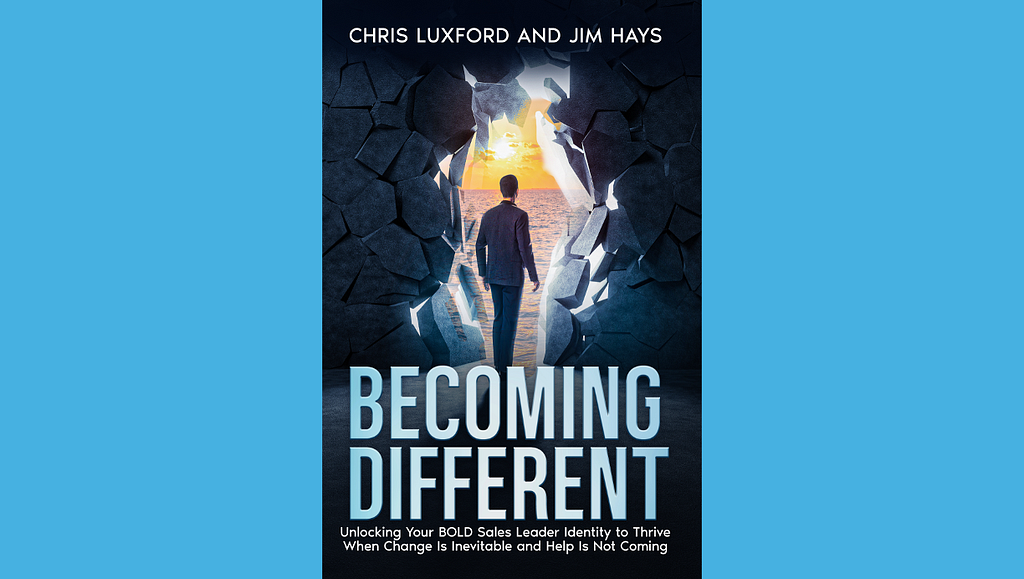 Our First Book — Becoming Different
Our First Book — Becoming Different
Tags: Customer Experience, Leadership, Sales
 The Lie Your CRM Tells You Every Single Day
The Lie Your CRM Tells You Every Single Day
Tags: Customer Experience, Leadership, Sales
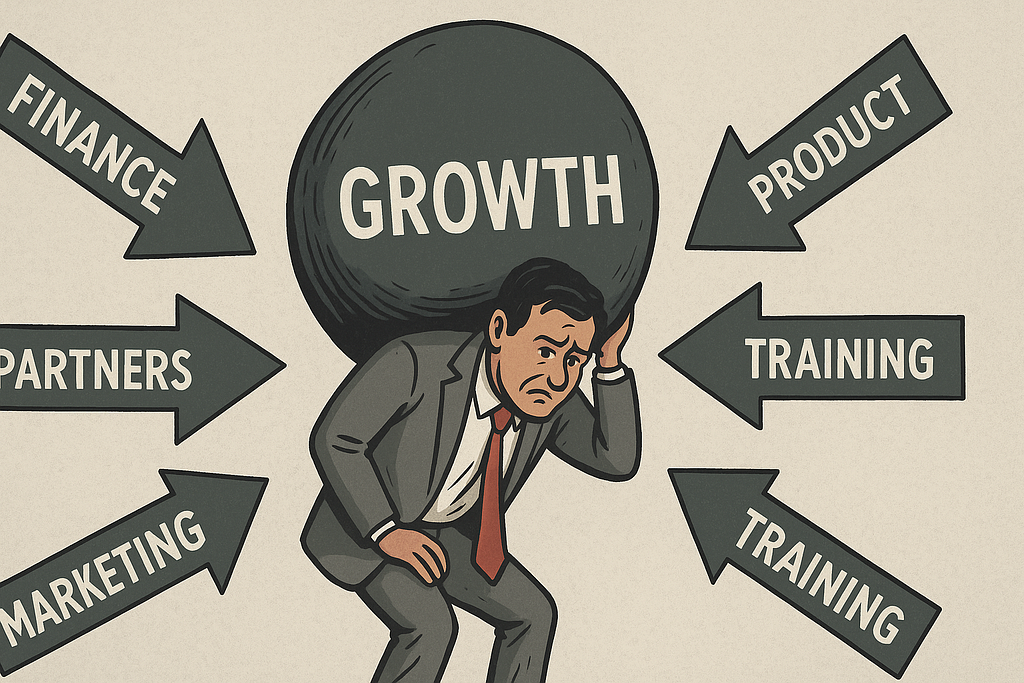 The Burden of Growth Without Control: A Call to Arms for Sales Leaders
The Burden of Growth Without Control: A Call to Arms for Sales Leaders
Tags: Customer Experience, Leadership, Sales
 It is that time of year again, where attention dramatically ramps up on closing out the year…
It is that time of year again, where attention dramatically ramps up on closing out the year…
Tags: Customer Experience, Leadership, Sales
 Why your best sales professionals walk…
Why your best sales professionals walk…
Tags: Customer Experience, Leadership, Sales
 Your sales team is busy. Also invisible.
Your sales team is busy. Also invisible.
Tags: Customer Experience, Leadership, Sales
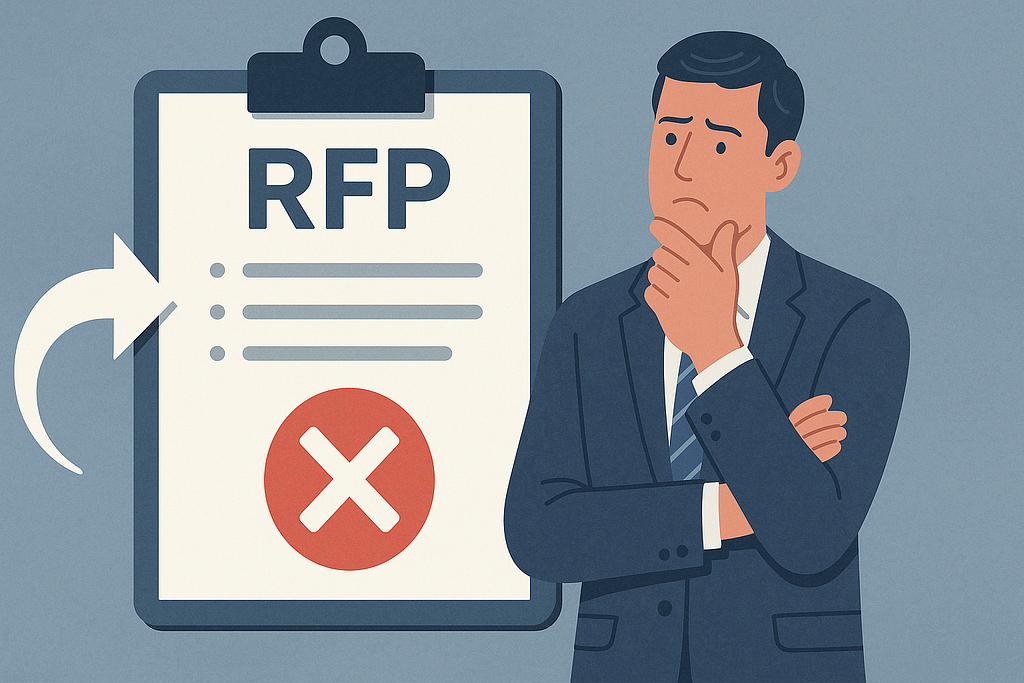 Are you too dependant on RFPs?
Are you too dependant on RFPs?
Tags: Customer Experience, Leadership, Sales
 The Crisis That Changed Everything: Why We Must Stop Trading Time and Start Trading Wisdom
The Crisis That Changed Everything: Why We Must Stop Trading Time and Start Trading Wisdom
Tags: Customer Experience, Leadership, Sales
 Why “Massive Action” Isn’t What You Think It Is
Why “Massive Action” Isn’t What You Think It Is
Tags: Customer Experience, Leadership, Sales
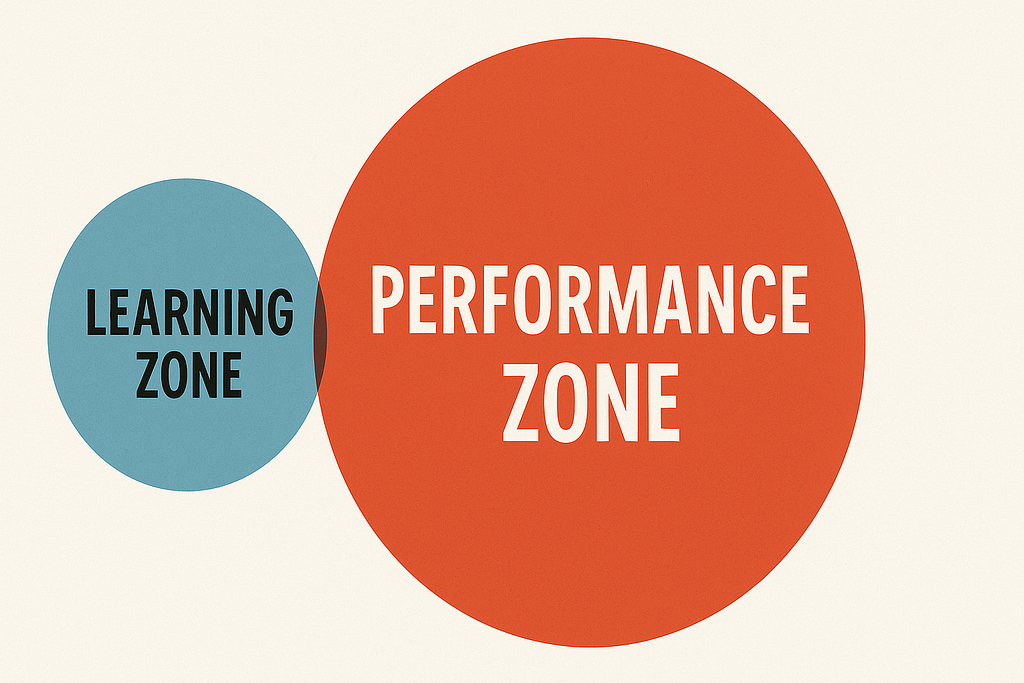 The Brutal Truth About Why You’ve Stopped Growing
The Brutal Truth About Why You’ve Stopped Growing
Tags: Customer Experience, Leadership, Sales
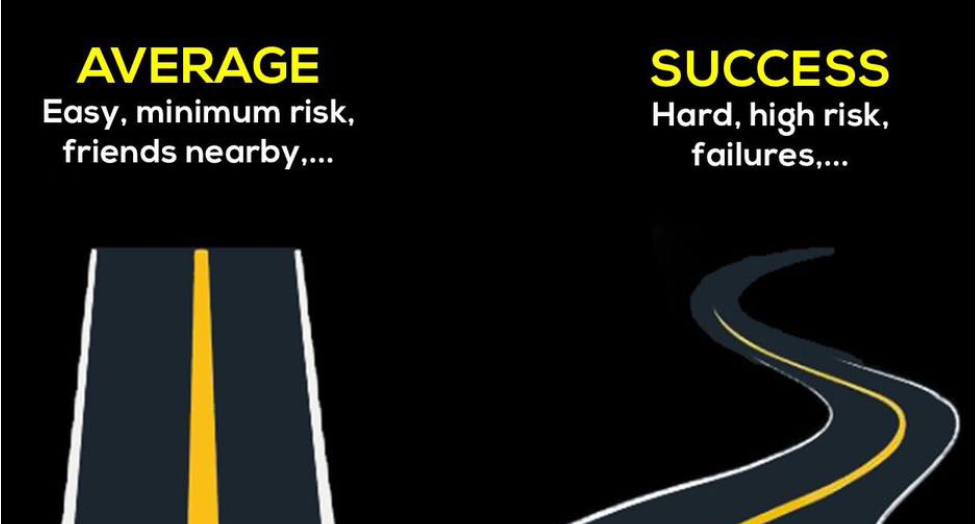 The Uncomfortable Truth About Complex B2B Sales: What Still Matters and What Needs to Die
The Uncomfortable Truth About Complex B2B Sales: What Still Matters and What Needs to Die
Tags: Customer Experience, Leadership, Sales
 “If it ain’t Broke Don’t Fix it” Versus “This is the Way We’ve Always Done It”
“If it ain’t Broke Don’t Fix it” Versus “This is the Way We’ve Always Done It”
Tags: Customer Experience, Leadership, Sales
 The Moment Everything Changes: Your Gobsmack Moment
The Moment Everything Changes: Your Gobsmack Moment
Tags: Customer Experience, Leadership, Sales
 The Extinction Courage: Why Your Greatest Success is Your Greatest Threat
The Extinction Courage: Why Your Greatest Success is Your Greatest Threat
Tags: Customer Experience, Leadership, Sales
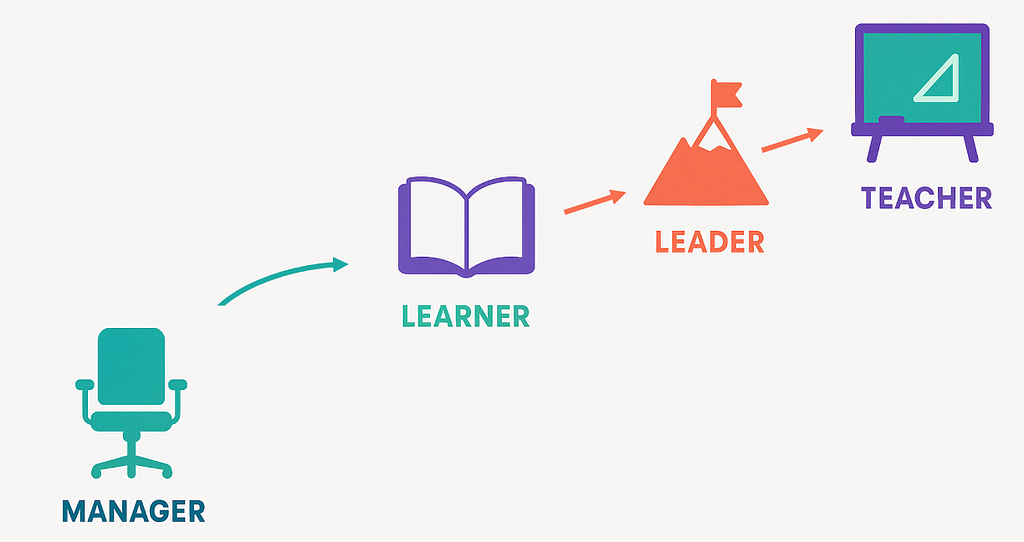 The Great Transition: From Managing Results to Leading People
The Great Transition: From Managing Results to Leading People
Tags: Customer Experience, Leadership, Sales
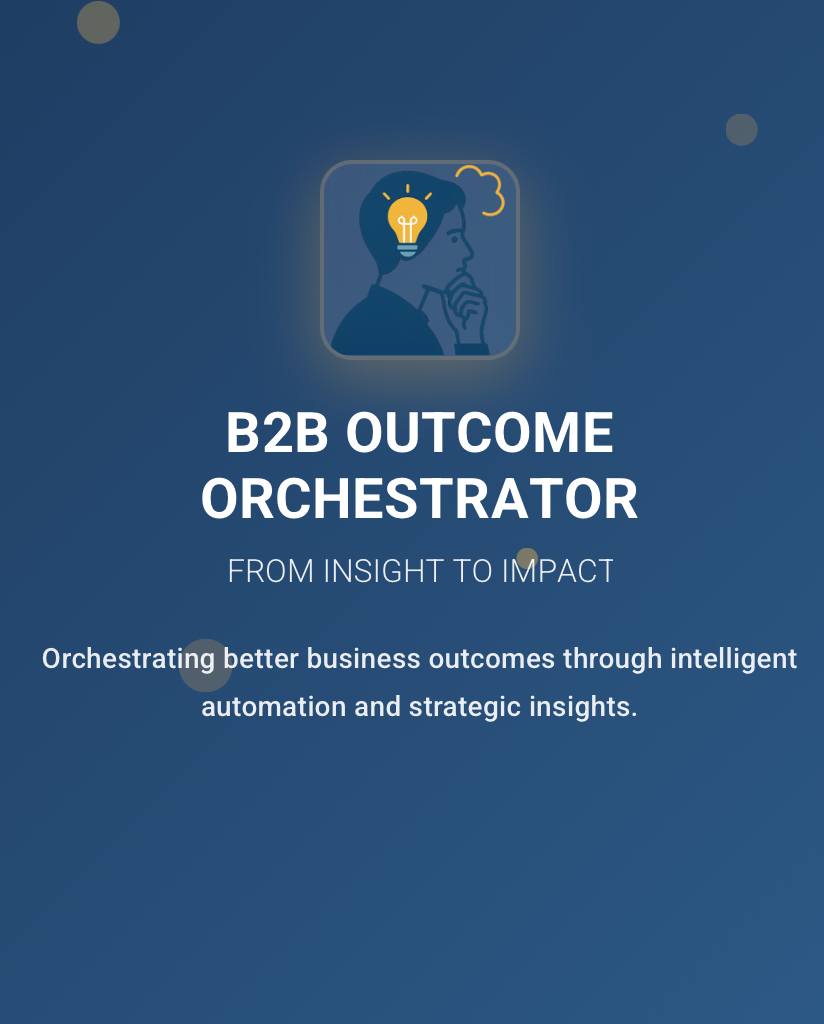 Introducing B2B Outcome Orchestrator — Your New Competitive Advantage
Introducing B2B Outcome Orchestrator — Your New Competitive Advantage
Tags: Customer Experience, Leadership, Sales
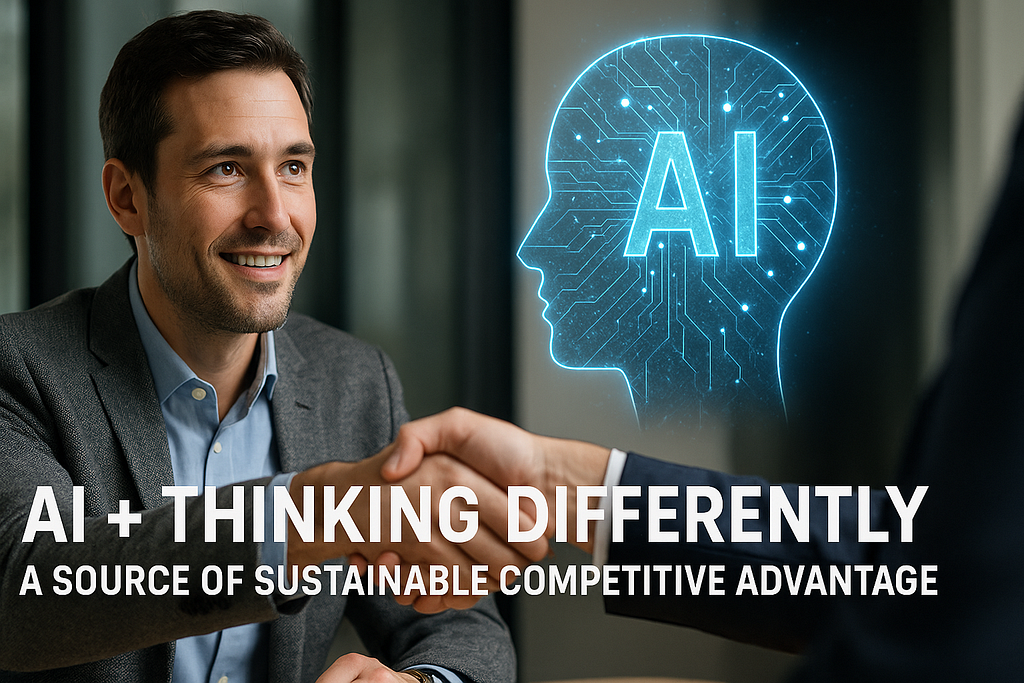 How Adaptation, Not Extinction, is Reshaping Professional Sales
How Adaptation, Not Extinction, is Reshaping Professional Sales
Tags: Customer Experience, Leadership, Sales
 Lifting Your Gaze: A Focus that sets High Performers Apart from Everyone Else
Lifting Your Gaze: A Focus that sets High Performers Apart from Everyone Else
Tags: Customer Experience, Leadership, Sales
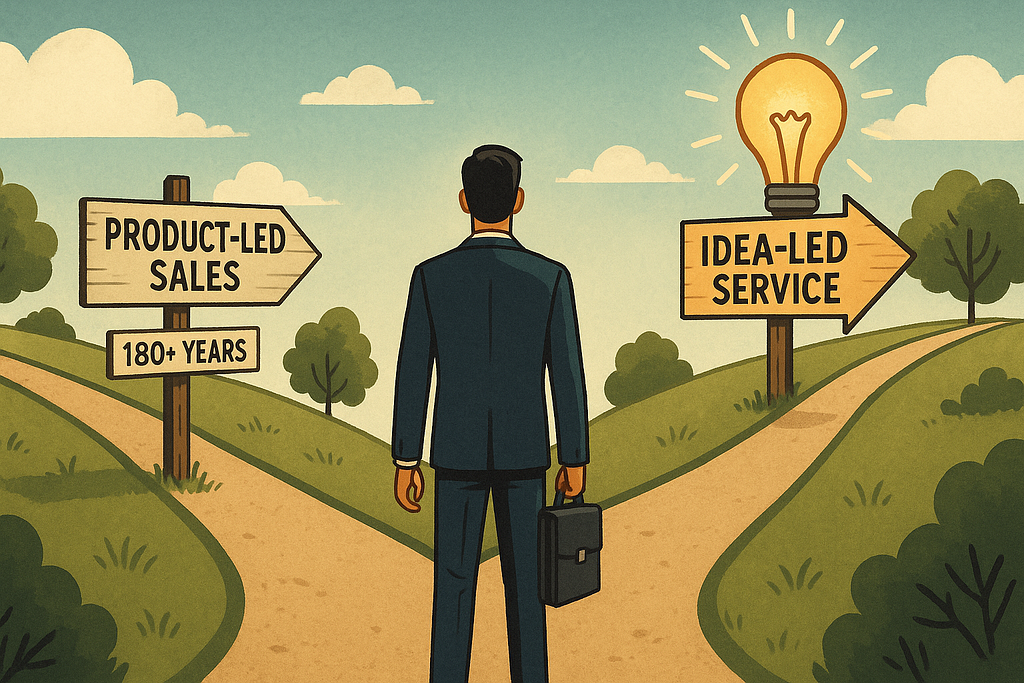 The Extinction Event: Why Only Idea-Led Sales Professionals Will Survive the Market Evolution
The Extinction Event: Why Only Idea-Led Sales Professionals Will Survive the Market Evolution
Tags: Customer Experience, Leadership, Sales
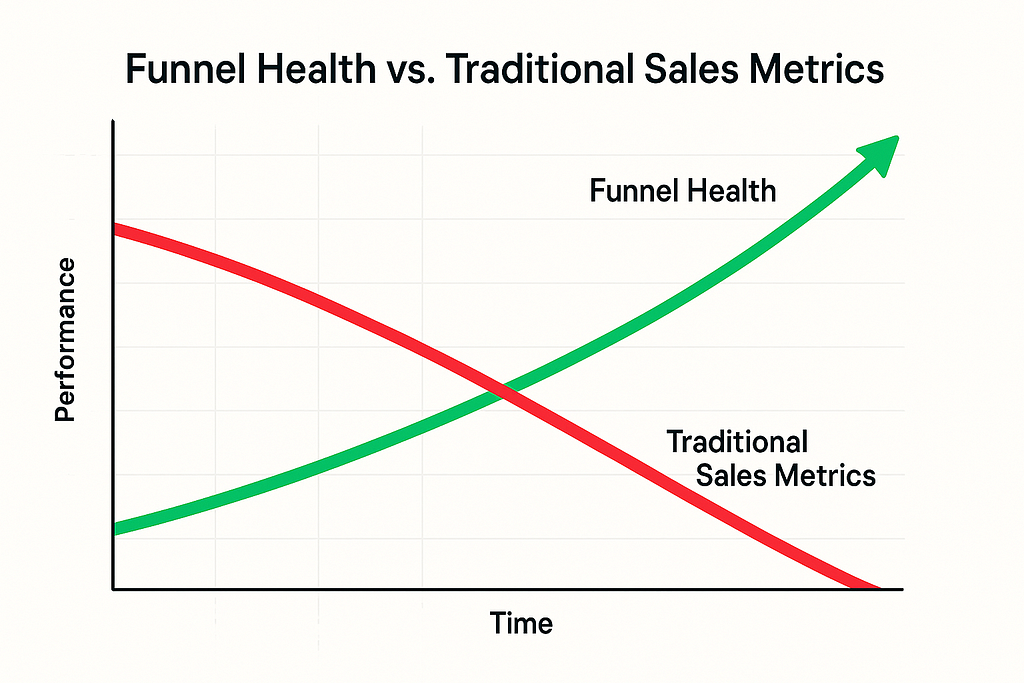 The One Sales Metric That Actually Predicts the Future (And Why You’re Ignoring It)
The One Sales Metric That Actually Predicts the Future (And Why You’re Ignoring It)
Tags: Customer Experience, Leadership, Sales
 The Three Fatal Flaws of Strategic Leadership: Why Only One Type Drives True Differentiation
The Three Fatal Flaws of Strategic Leadership: Why Only One Type Drives True Differentiation
Tags: Customer Experience, Leadership, Sales
 Why Sales Leaders Must Chart Their Own Course Without Support Functions
Why Sales Leaders Must Chart Their Own Course Without Support Functions
Tags: Customer Experience, Leadership, Sales
 The enemy of growth.....is ourselves
The enemy of growth.....is ourselves
Tags: Customer Experience, Leadership, Sales
 Why only the wise will thrive
Why only the wise will thrive
Tags: Customer Experience, Leadership, Sales
Tags: Customer Experience, Leadership, Sales
Tags: Customer Experience, Leadership, Sales
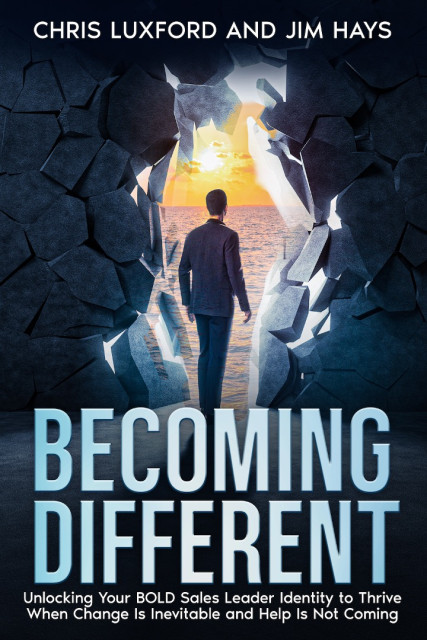 Becoming Different
Becoming Different
Tags: Business Strategy, Leadership, Sales
Tags: Customer Experience, Leadership, Sales
Tags: Customer Experience, Leadership, Sales
Tags: Customer Experience, Leadership, Sales
Tags: Customer Experience, Leadership, Sales
Tags: Customer Experience, Digital Transformation, Leadership
Tags: Innovation, Leadership, Sales
Tags: COVID19, Customer Experience, Sales
Tags: Customer Experience, Leadership, Sales
Tags: Customer Experience, Leadership, Sales
 The Delusion of Sales Professionals: Proclaiming client-centricity yet acting with self-interest
The Delusion of Sales Professionals: Proclaiming client-centricity yet acting with self-interest
Tags: Customer Experience, Leadership, Sales
 Leadership Question Series #2
Leadership Question Series #2
Tags: Business Strategy, Leadership, Sales
Tags: Customer Experience, Digital Transformation, Innovation
Tags: Customer Experience, Leadership, Sales
Tags: Customer Experience, Leadership, Sales
 Bold and insightful leadership
Bold and insightful leadership
Tags: Leadership, Sales, Business Strategy
Tags: Customer Experience, Leadership, Sales
Tags: Customer Experience, Leadership, Sales
Tags: Customer Experience, Leadership, Sales
Tags: Customer Experience, Leadership, Sales
Tags: Customer Experience, Leadership, Sales
Tags: Customer Experience, Leadership, Sales
Tags: Customer Experience, Leadership, Sales
Tags: Customer Experience, Leadership, Sales
Tags: Customer Experience, Leadership, Sales
Tags: Customer Experience, Leadership, Sales
Tags: Innovation, Leadership, Sales
Tags: Innovation, Leadership, Sales
Tags: Innovation, Leadership, Sales
Date : October 23, 2022
Date : October 25, 2022
 Why Outcome-Based Selling is Dead
Why Outcome-Based Selling is Dead
In last week's post I made a bold statement that outcome-based selling was dead.
In 2008, we started helping our clients move from a product and solution selling approach to an outcome-based one. At the time we declared, that within 10-15 years "everyone will be doing it". At which point it will no longer be differentiated, and as such, no longer the approach that leaders will embrace.
Today, almost every company or sales professional says they are outcome-based. Are they? Really? That is debatable in our view. Many say they are but it is really lipstick on a pig. It is still product or solution led with some outcome-based language wrapped around it. That said a large majority of companies have attempted to get better at aligning their offerings with their clients and prospects outcomes.
However, we believe outcome-based selling no longer offers any differentiation at all. We still absolutely believe that clients deserve better business outcomes from their technology investments and that those providing that technology should be far far deeper involved and rewarded around those impacts on outcomes.
To truly differentiate now and over the coming years a better and different approach MUST be embraced and a new journey commenced.
In a market that is overwhelmed by products and services where clients and prospects have almost unlimited choice;
Where clients and prospects are almost always more educated on the range and diversity of choice than the average sales professional;
When company budgets are shrinking over time and investments require significant impact on growth targets;
How can a sales professional bring value to a client or prospect?
There are some fundamental shifts, but they are underpinned by the key questions from last week's article:
Whatever you are planing to do, in the eyes of your client or prospect is it meaningfully different?
These shifts include:
In short outcome-based selling was an attempt to shift a corporation from a company-centric to a customer-centric engagement model.
This new, better and different approach is not about the corporation.
It is about you.
A corporation cannot help you discover how to meaningfully differentiate to each of your individual clients or prospects. It can only help you be scalably efficient. And provide you a generic message about its offerings.
To be sustainably, truly, meaningfully different in the eyes of your clients and prospects you must re-invent your identity.
What does re-invent your identity mean? Here is a great 23 second video.
https://www.youtube.com/watch?v=0969Klx6SlM
This identity re-invention will be a learning journey not training or episodic events. It will not be about what the corporation directs you to do, but the journey you are willing to embark yourself on.
There are lots of smart people...but how many are truly wise? Wise in a way that adds amazing value to your clients or prospects. Our definition of that wisdom, applied wisdom is:
Over the coming weeks I will explore more about what the above shifts really mean and why it can help you be massively more successful in the coming years.
Tags: Innovation, Leadership, Sales
 AI’s Role in Complex B2B Sales: Vitally Important or Woefully Inadequate?
AI’s Role in Complex B2B Sales: Vitally Important or Woefully Inadequate?
Before I offer my personal perspective on this admittedly provocative question, please permit me to share this oft-cited quote from Amazon’s founder and executive chairman, Jeff Bezos.
“I very frequently get the question: ‘What’s going to change in the next 10 years?’ And that is a very interesting question; it’s a very common one. I almost never get the question: ‘What’s NOT going to change in the next 10 years?’ And I submit to you that that second question is actually the more important of the two, because you can build a business strategy around the things that are stable in time. In our retail business, we know that customers want low prices, and I know that’s going to be true 10 years from now. They want fast delivery; they want vast selection. It’s impossible to imagine a future 10 years from now where a customer comes up and says, ‘Jeff I love Amazon; I just wish the prices were a little higher,’ or ‘I love Amazon; I just wish you’d deliver a little more slowly.’ Impossible. And so, the effort we put into those things, spinning those things up, we know the energy we put into it today will still be paying off dividends for our customers 10 years from now. When you have something that you know is true, even over the long term, you can afford to put a lot of energy into it.” — Jeff Bezos
So, back to the question at hand. Is AI’s role in complex B2B sales going to be vitally important or woefully inadequate?
My answer is an emphatic “Yes!”
AI will be both vitally important AND woefully inadequate for all the various jobs that will still need to be done ten years from now in a complex B2B buying/selling scenario. Please allow me to elaborate.
Rightfully so, Artificial Intelligence is on every sales executive’s mind today. Articles on how AI is going to “revolutionize selling” can be found everywhere now. But as researcher, scientist, and futurist, Roy Amara, observed, “We tend to overestimate the effect of a technology in the short run and underestimate the effect in the long run.” This will certainly be true with regards to AI’s impact on selling, and perhaps more importantly, buying.
A quarter century ago, the rise of the Internet radically transformed the way that both buying and selling were done. However, the net result of the Internet revolution was that buyers were ultimately more empowered by the Internet than most sales teams were. This resulted in an unquestioned shift in the balance of power from sellers to buyers.
Likewise, AI will also profoundly transform those buyer/seller interactions over the next decade. Is it possible that AI will produce an even greater shift in that balance of power from sellers to buyers? At this juncture, it’s impossible to say for certain.
However, it is reasonable to assume that over the next decade virtually all B2B sales organizations will have figured out how to effectively integrate AI into their operations, if for no other reason than to remain competitive with every other B2B sales organization.
So, the most important question for CEOs and CROs in an AI-enabled future will remain the same as it is today. How does an organization add more value for all the various buying interests in a complex enterprise organization than its competition?
AI will invariably drive massive changes in buying and selling over the next decade. However, as the earlier Jeff Bezos quote suggests, the more important question for senior executive is not what is going to change; it is “what’s not going to change?”
What won’t change over time is an organization’s need for greater insights on how to:
AI will ultimately be able to add some degree of value to those requirements. However, the kind of wicked and super wicked scenarios that surround new technology purchases and rollouts demand many uniquely human characteristics like empathy, imagination, emotional intelligence, ecosystem coordination, and wisdom.
Perhaps the most interesting of those traits in relation to AI’s limitations is wisdom, which requires a high degree of experience, synthesis, and an ability to “connect the dots.”
The late, great Charlie Munger (Warren Buffet’s long-time mentor and business partner) advocated for the criticality of something he referred to as elementary, worldly wisdom. He described it this way.
“What is elementary, worldly wisdom? Well, the first rule is that you can’t really know anything if you just remember isolated facts and try and bang ’em back. If the facts don’t hang together on a latticework of theory, you don’t have them in a usable form. You’ve got to have models in your head. And you’ve got to array your experience — both vicarious and direct — on this latticework of models. You must know the big ideas in the big disciplines, and use them routinely — all of them, not just a few. Most people are trained in one model — economics, for example — and try to solve all problems in one way. You know the old saying: to the man with a hammer, the world looks like a nail. This is a dumb way of handling problems.” — Charlie Munger
In complex B2B sales situations with high-level executives, we see far too many smart, well-intentioned sellers struggle to connect with and fully relate to those executives because they tend to think too much like that proverbial man with a hammer.
So, why are so many hard-working sales teams, especially in the enterprise technology space, struggling to attain that holy grail of executive relevance that virtually very CRO is looking for from their sellers?
In our opinion, gleaned from over two decades of experience with thousands of Fortune 500 B2B sales teams, the vast majority of sellers simply don’t possess a sufficient number of multi-disciplinary mental models to pull from. They also struggle to assemble their limited or less effective models into an actionable, interrelated latticework that might otherwise improve their chances of being relevant to a high-level executive.
To attain greater executive relevance, sales teams will need to possess a broader sense of business insights that arise from these kinds of multi-disciplinary models and latticeworks. They are the foundation of the kind of worldly wisdom that senior execs are looking for from someone they might consider a trusted advisor.
We refer to this ability of sellers to bring valuable business insights to a high-level executive as Applied Wisdom (AW). In a world where AI is already becoming pervasive, we believe that AW will be a much greater and more-dificult-to-replicate differentiator than AI.
For that reason, we believe the key catalytic question that will get CEOs and CROs closer to realizing that opportunity is how to go about the process of creating greater AW in their sales team…and do it at scale.
This is the first in an ongoing series of posts where we will explore what it will take to develop AW-empowered sales teams at scale. Please join us in that journey.
Tags: AI, Business Strategy, Sales
 Embracing the Timeless Legacy of Charlie Munger: A Eulogy for a Master of Lifelong Learning
Embracing the Timeless Legacy of Charlie Munger: A Eulogy for a Master of Lifelong Learning
In the vast tapestry of business leaders and intellectuals, Charlie Munger's departure leaves an indelible mark. As we bid farewell to this titan of wisdom and discernment, we celebrate not only his life but also the enduring legacy he leaves behind—a legacy steeped in the principles of lifelong learning, worldly wisdom, and an insatiable curiosity that transcends generations.
I have barely scratched the surface of his insight and look forward to his continued guidance - his true dent in the universe.
Charlie Munger was, above all, a perpetual student. His commitment to lifelong learning was not merely a mantra but a way of life. Munger believed that the best investment one could make was in themselves, and his insatiable appetite for knowledge was a testament to this philosophy.
Key Takeaway for Business Leaders: Business leaders must embrace the ethos of continuous learning. In a dynamic and ever-evolving business landscape, the ability to adapt and learn is a cornerstone of success. Munger's legacy encourages leaders to remain avid learners, to seek knowledge beyond their immediate domains, and to recognize that intellectual growth is a lifelong journey.
Charlie Munger's understanding of "worldly wisdom" set him apart. He championed the idea that true wisdom comes from a multidisciplinary approach, drawing insights from various fields to make informed decisions. Munger's worldly wisdom was a force that guided him through the complexities of business and life.
Key Takeaway for Business Leaders: Business leaders should strive for a holistic understanding of the world around them. Munger's approach advocates for transcending narrow specialization and incorporating diverse perspectives into decision-making. By embracing a multidisciplinary mindset, leaders can navigate uncertainties with clarity and foresight.
Munger's unquenchable curiosity was the driving force behind his success. He approached life with a childlike wonder, always questioning and exploring. His curiosity wasn't confined to boardrooms; it extended to a wide array of subjects, from psychology to history, allowing him to draw upon a rich tapestry of knowledge.
Key Takeaway for Business Leaders: Leaders should cultivate and perpetuate a culture of curiosity within their organizations. Munger's legacy underscores the importance of encouraging employees to ask questions, challenge assumptions, and explore new ideas. A curious workforce fosters innovation and resilience in the face of change.
Charlie Munger faced challenges with a stoic resilience that mirrored his intellectual rigor. He understood that setbacks were inevitable, but it was one's response to adversity that truly mattered. Munger's ability to maintain composure and learn from setbacks exemplifies the power of a resilient mindset.
Key Takeaway for Business Leaders: In the volatile world of business, leaders must embrace challenges as opportunities for growth. Munger's stoic resilience teaches us that setbacks are not failures but stepping stones toward success. Leaders should instill this mindset within their teams, fostering a culture that values resilience and learning from setbacks.
As we bid farewell to Charlie Munger, let us not mourn the end of a life but celebrate the enduring legacy of a man who dedicated himself to the pursuit of wisdom, learning, and curiosity. In a world hungry for insights and guidance, let us carry forward the torch of Charlie Munger's timeless wisdom, using it to illuminate the path for generations of leaders yet to come.
Tags: Leadership, Sales
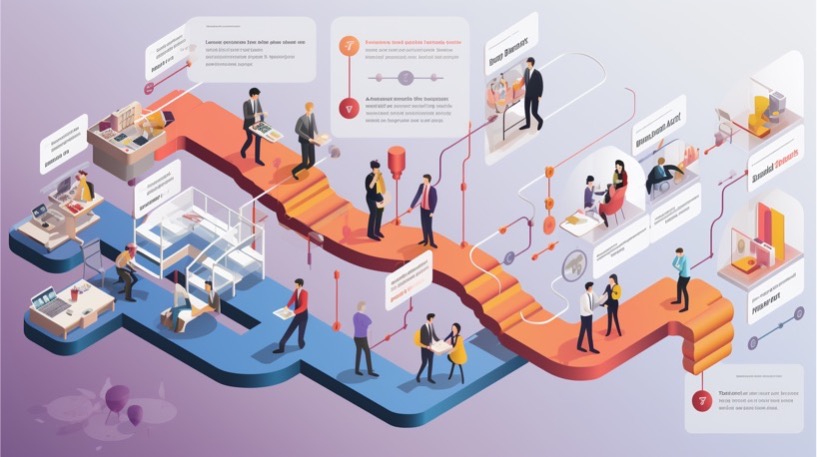 The Fallacy of One-Size-Fits-All: Why a Single Sales Methodology Fails in Complex B2B Sales
The Fallacy of One-Size-Fits-All: Why a Single Sales Methodology Fails in Complex B2B Sales
In the world of business-to-business (B2B) sales, where the stakes are high and the playing field is complex, relying on a single sales methodology is akin to trying to fit a square peg into a round hole. While simplicity is often touted as a virtue, it can be a crippling limitation when applied to the intricate and multifaceted realm of B2B sales.
The belief is that it is too hard to deploy, learn and manage (and become highly productive) multiple methodologies. I agree. The fallacy here is that methodologies are the only choice. There is an alternative choice to numerous highly prescriptive methodologies.
I am boldly asserting that the one-size-fits-all approach to sales methodologies falls short in the context of complex B2B transactions and in fact hurts not helps results. Instead, successful B2B sales demand a flexible and adaptable arsenal of models (not methodologies). Here's why.
1. Diverse Customer Needs
In the B2B world, clients and customers come in all shapes and sizes. Each client has unique requirements, objectives, and pain points. Attempting to shoehorn a single sales methodology into every interaction ignores the fundamental principle that understanding and addressing these differences is key to building lasting customer relationships. Yet we every sales team we have ever met will vehemently tell us they are “customer centric” and yet general use an approach that is less about the customer and more about the booking.
Consider, for instance, the difference between selling software solutions to a multinational corporation and a local family-owned business. The former may require extensive customization, integration, and rigorous compliance standards, while the latter may prioritize simplicity and affordability. A cookie-cutter sales approach is doomed to fail in either scenario.
2. Varied Decision-Making Processes
Complex B2B sales often involve multiple stakeholders, each with their own interests and influence over the final decision. In fact, we’ve seen buying committees as large as 12-15 people. From the CEO to the procurement manager and the IT department, each player in the decision-making process has distinct needs and priorities. A one-size-fits-all approach disregards the intricate web of relationships and dynamics at play.
Imagine employing the same sales script and tactics with a CFO focused on cost reduction and a CTO seeking innovation and scalability. In the former, you may alienate the decision-maker with a pitch centred on premium features, while in the latter, you might lose credibility by neglecting cost considerations. Again, it is asserted by sales teams that is not the approach, they personalise the engagement by persona. But the underlying “playbook” is always the same….with cost savings as the number #1 value proposition pitched to any and all buying executives.
3. Evolving Market Conditions
The B2B landscape is in a perpetual state of flux. Market conditions, industry trends, and technological advancements constantly shape the environment in which businesses operate. A static sales methodology fails to adapt to these changes, leaving sales teams ill-equipped to navigate the shifting terrain. It’s a VUCA world !!
For example, a rigidly structured methodology may prove ineffective when dealing with the disruptive forces of a global pandemic or a sudden economic downturn. In such cases, adaptability, agility, and a willingness to pivot are essential for survival and success.
4. The Human Factor
In B2B sales, the human element is paramount. Relationships built on trust, empathy, and understanding play a pivotal role in securing deals. A rigid, one-size-fits-all approach risks depersonalizing the sales process, reducing it to a transactional exchange of goods or services. Take a look at the 3-5 most common PowerPoint decks that are used by your sales team…I’ll hazard a guess they are all pretty similar and, for the most part, talk about your company and your offering…not the client and their outcomes.
Successful B2B salespeople are chameleons, able to adjust their approach to connect with the diverse personalities and communication styles of their clients. They listen, empathise, and tailor their strategies accordingly – qualities that a single, inflexible methodology cannot provide.
5. Sales Tools' Inability to Cater to Multiple Processes
Another glaring issue with relying on a single sales methodology in complex B2B sales is the limitation of sales tools and technologies. While sales automation tools and Customer Relationship Management (CRM) systems are valuable for managing customer data and tracking activities, they often fall short when it comes to accommodating various sales processes.
Different prospects may have unique workflows, approval processes, and procurement methods. Attempting to force all these variations into a standardised sales tool can result in inefficiencies and frustrations. A single process-centric tool might not have the flexibility to adapt to the intricacies of each customer's buying journey.
6. Sales Processes Focus on Activities, Not Buyers' Needs
Many conventional sales processes are inwardly focused, emphasising the activities sales teams need to perform to close a deal. While this approach can be effective to some extent, it often neglects the most crucial aspect: the buyer's journey.
Successful B2B sales should revolve around understanding the buyer's needs, challenges, and preferences. A rigid process-centric approach may force salespeople to prioritize their activities over the buyer's requirements, potentially alienating customers and hindering the sales process.
Conclusion
Complex B2B sales demand a nuanced and multifaceted approach using many many models (not methodologies). Relying on a single sales methodology in such an environment is a recipe for failure. Instead, businesses must recognise the diversity of customer needs, the intricate decision-making processes, the ever-changing market conditions, the limitations of sales tools, and the importance of aligning sales processes with buyers' needs.
Successful B2B sales require adaptability, agility, and a toolbox of models that can be adapted and used as a framework to fit the unique circumstances of each sales opportunity and allow scale for the sellers.
To thrive in the complex world of B2B sales, embrace the idea that one size does not fit all, and empower your sales teams to be the agile, responsive, and client-centric professionals that your clients deserve. Only then can you navigate the intricate maze of complex B2B sales successfully and truly grow in each of your unique market segments you are actively pursuing.
Tags: Customer Experience, Leadership, Sales
 Calling bullshit on AI in complex B2B sales
Calling bullshit on AI in complex B2B sales
Every tool or platform every professional seller is using today, regardless of sophistication, will claim it is AI (Marketing teams riding the wave). Moreover a lot of B2B technology sales professionals trumpet the fact their own technologies are now "AI enabled".
I'm calling bullshit!
The simple reality is that since time immemorial tools, any tool, from the plough to the super computer, has been designed to make work easier, faster, simpler and more productive.
In recent times the ability for these tools to tackle activities that the sales profession did not have tools for, such as researching clients, collaborative ideation, financial analysis, prospecting content creation, automated follow up etc, has been impressive and significant.
But it does not change the simple fact that sales is the art of persuading and influencing a buyer, or in the case of complex B2B sales, many buyers to choose your offering over their other choices, which include "do nothing".
That choice is always led emotionally and justified with facts and logic.
How often have you seen the better product or service lose?
How often have you seen "no decision" the elected choice, even in the face of compelling reasons to invest?
In professional selling, how we sell is far more important than what we sell.
This is underpinned by outrageous successful selling is more about how we think, rather than what we do.
My observation is that sellers are using many many tools now, including many that are labelled as AI. ChatGPT for prospect email creation is a good example. The flaw in this is that sellers are using these tools in such a way that is reducing thinking. The tools are being used to speed up task completion, rather than being a catalyst to deeper more provocative thinking.
Successful sellers don't view these tools as artificial intelligence....i.e;
And when every seller is using the same tools for the same thing does it create any level of meaningful differentiation?
Successful sellers use these tools for curiosity, ideas, spur imagination, explore different questions, role play, hypotheticals.
Successful sellers use these tools to evolve their selling mindsets. Rather than using them as task automators they use these tools to unlearn and relearn buyer psychology and the art of influence and persuasion.
Continued innovation in tools will be a constant, but the human condition...that is buying on emotion, requires sellers to focus less on task automation and far far more on what sellers are paid to do: Think for a living !
These so called AI tools can't think for us. Nor should we want them to. If a tool can think better and as a result influence and persuade better, then why do we need sales people?
Great sellers use tools, any tool, AI labeled or not, to elevate their thinking, curiosity, imagination and questioning.
Are you using them this way?
Tags: Generative AI, Leadership, Sales
 There is no strategy without risk and courage
There is no strategy without risk and courage
It is said common sense is not common. The same could be said for conventional wisdom. It is not wise.
Many organisations believe their strategy is sound, well thought through and effective. Yet often it mirrors the so called "strategy" of their competitors.
Roger Martin defines strategy as Making Choices: Where to play and How to win.
There are no guarantees in business, but the nearest executives have to guaranteed success, at least from an initial strategy choice is; identify a genuine unmet market need and find a way to meet that need in a way no one else is, or can, with a sole focus on outrageous customer delight.
Many executives will vehemently defend their well defined "plans" as a strategy where they have made quite a number of choices. However, these choices tend to be developed using very conventional models and mindsets;
This conventional approach often results in flat to either slightly increased or slightly decreased revenue and profits. Inline with many other contenders in that given market space.
Leaders, genuine breakaway differentiators, do not leverage conventional wisdom nor conventional models.
They understand that strategy, and the choices required to win, are underpinned by risk and courage.
While risks are typically associated with negative outcomes, exponential growth and differentiation is found in the risk areas that are in fact opportunities for innovation, growth, and competitive advantage.
Risk taking, not risk mitigation, is the key area of exploration and choice.
Within large organisations there exists an invisible barrier to busting the status quo. Everybody can say no, but very few people can say yes. The result is great ideas, and hence choices, often never see the light of day, let alone given an opportunity to succeed.
Courage is providing well thought through options, from do nothing, to radical disruptive innovation, especially focussed on the business model, that can be robustly debated and discussed. The courage to engage in that discussion and explore each option equally asking the simple question "what would need to be true" for that option to succeed.
A number of companies are currently in the midst of 2024 planning. Planning is not strategy and plans should be developed after a clear, concise and communicated strategy is finalised.
That said, if you or your organisation is currently reviewing your strategy, here are six risk and courage areas you can ask to bring a greater focus on risk taking choices and the courage to make the hard, difficult and unconventional choices.
1. Risk Appetite:
Courageous decision-makers are often more willing to embrace higher levels of risk. They have the confidence to take calculated risks that can lead to significant rewards.
Conversely, leaders who are risk-averse may shy away from bold decisions even when potential benefits outweigh the risks.
Ask: What is the risk of doing nothing?
Ask: What is the risk of doing broadly the same as everyone else in our market?
Ask: Will cost reduction initiatives deliver growth?
2. Innovation and Disruption:
Courageous leaders are more likely to champion innovative strategies that disrupt existing norms and markets. They have the vision to see opportunities where others may see only risks.
Embracing innovation can involve taking significant risks, such as investing in unproven technologies or entering new, uncharted markets.
Ask: What is the true, hiding in plain sight, unmet market need?
Ask: Why hasn’t anyone addressed that need yet?
Ask: What would need to be true to capture that opportunity?
3. Decision Speed:
Courageous decision-makers are often more decisive. They don't let fear of risk paralyse them, and this can lead to faster decision-making.
In rapidly changing environments, swift decision-making can be crucial to capitalize on opportunities or respond effectively to emerging risks.
Ask: Is data fallacy hurting us not helping us (here are 10 well known data fallacies https://www.litera.com/blog/a-quick-guide-to-data-fallacies-and-how-to-avoid-them/)?
Ask: Do we have the ability (historically and moving forward) to rapidly pivot if the decision needs to be adjusted?
Ask: Why do so many people need to be involved? Notwithstanding decisions, especially in large companies, cannot be made in isolation, but they shouldn’t become referendums.
4. Leading Change:
Courageous leaders are more adaptable and willing to lead change. They understand that avoiding or worse, resisting change can be riskier in the long run than leading it.
In industries facing disruption, leaders who courageously advocate for, lead and empower change can position their organisations to thrive amid uncertainty.
Ask: What are the change leadership models our leaders will use to lead change?
Ask: Without change being led, truly led, what are the chances of success for a bold disruptive strategy?
Ask: What would need to change, radically change, to underpin success. The business model? Talent model? Customer delight model? Risk model? Economic model? Operating model? Or all of the above and HOW will these models be changed
5. Communication and Alignment:
Courageous leaders can inspire and rally their teams around a common vision, especially when pursuing risky strategies. They can communicate the rationale behind their decisions effectively.
Aligning teams and stakeholders is vital for the successful execution of risky strategies, as it ensures everyone is on board with the chosen path.
Ask: Is our strategy clear and concise? Or is it vague, general, and filled with business buzzword bingo
Ask: Can (or will) every employee be able to both articulate and understand the strategy and the role they play in its success? If not, why not and if not, how can that be corrected
Ask: How different does our strategy sound and feel to both known and unheralded competitors?
6. Learning from Experiments:
Courageous decision-makers are hyper-experimenters. They view experiments as a learning opportunity rather than worthless investment and risk. They are more likely to encourage a culture where employees feel safe to undertake many experiments and learn from their outcomes and observations.
This willingness to embrace experimentation as a part of the growth process can lead to innovation and resilience.
Ask: Are we doing enough experiments – both large and small?
Ask: Do we provide the right environment and empowerment for experiments to occur naturally?
Ask: Do we have a process to scale successful experiments?
Summary
Great game-changing strategies require choice. A choice to take risk not mitigate it and a choice to courageously make choices that break with conventional wisdom.
Asking the above questions will not give you the answer to which of the options you are considering is the better option, but hopefully these questions will help you in your process of choosing. Especially in forcing you to think bigger, bolder and better (exponentially) and allow you to escape the conventional "annual planning process" that is the most conventional of all models (and very incremental at best).
Tags: Business Strategy, Innovation, Sales
 Why Outcome-Based Selling in today's VUCA world massively outperforms Product-Led Selling
Why Outcome-Based Selling in today's VUCA world massively outperforms Product-Led Selling
Outcome-based selling is a sales approach that focuses on helping customers achieve specific outcomes or goals, rather than simply selling them a product or service. This approach is gaining popularity in many industries, as it helps salespeople better understand the needs and challenges of their customers and allows them to tailor their solutions to meet those needs. In contrast, product-based selling is a more traditional approach that focuses on selling specific products or services, regardless of the needs or goals of the customer.
There are several reasons why outcome-based selling is often considered to be a better approach than product-based selling:
It helps salespeople build stronger relationships with customers: By focusing on helping customers achieve their desired outcomes, salespeople can build trust and credibility with their customers, as they are seen as being more concerned with the customer's needs than simply making a sale. This can lead to stronger, more enduring relationships with customers, which can be particularly valuable in industries where customer loyalty is important.
It allows salespeople to differentiate themselves: In many cases, customers have a variety of options when it comes to purchasing products or services. By focusing on outcomes, salespeople can differentiate themselves from competitors who are simply selling products or services. This can help salespeople stand out in a crowded market and increase their chances of making a sale.
It enables salespeople to create value for customers: By helping customers achieve specific outcomes, salespeople can create value for their customers. This can be particularly valuable in industries where the value of a product or service is difficult to quantify, as it allows salespeople to clearly demonstrate the value of their offerings to customers.
It allows salespeople to be more consultative: Outcome-based selling often involves working closely with customers to understand their needs and challenges and helping them identify the best solutions to meet those needs. This consultative approach can be particularly effective in industries where customers value expertise and guidance, as it allows salespeople to position themselves as trusted advisors.
It can lead to longer-term customer relationships: By helping customers achieve specific outcomes, salespeople can create value for their customers and build strong, trusting relationships. This can lead to longer-term customer relationships, as customers are more likely to return to the salesperson or company when they have additional needs or challenges.
Overall, outcome-based selling is a more customer-centric approach that can be more effective at building strong, lasting relationships with customers and differentiating salespeople from competitors. It allows salespeople to create value for customers, be more consultative, and position themselves as trusted advisors. While product-based selling can still be effective in some cases, outcome-based selling is often a better approach for creating long-term value for both salespeople and their customers.
Tags: Customer Experience, Leadership, Sales
 Business Outcome-based Go-To-Client Model Innovation: Tips to Help You Achieve Success
Business Outcome-based Go-To-Client Model Innovation: Tips to Help You Achieve Success
Business-to-Business (B2B) Outcome-based go-to-client models are gaining popularity as companies seek more effective, measurable and lasting ways to deliver meaningful, sustainable innovation and differentiation to underpin growth. These new go-to-client models, which focus on clients desired business outcomes instead of the products sold, help companies build fundamentally different relationships with their clients. This approach also enables sellers to identify and target high-potential clients in ways their competitors either can't or won't. By shifting from a product and/or service-centric strategy to a business outcome-based one, businesses can accelerate innovation, reach new clients and achieve growth results not previously achievable. This blog post shares 5 tips for business outcome-based go-to client model innovation that will help you as your organization transform.
What made you successful won't make you successful.
Success will be achieved through transformation, not incrementalism.
Organizational Buy-in and Commitment
Before you begin designing your outcome-based go-to-client models, you need to ensure you have the buy-in and commitment of key stakeholders across the organization. This means that business leaders, marketing and sales leaders, and customer service teams are involved and working towards achieving the same outcomes. To get buy-in and commitment, you need to demonstrate how business outcome-based strategies will benefit the organization and its stakeholders. The challenge here is intellectually every executive "gets it". In fact they may suggest they are already outcome-based. Yet more often than not the behaviour of the organisation is still product/service centric. The buy-in sought here is to consistently challenge the status quo. To consistently challenge "are we really there yet". This is required from every leader at every level.
Define Your Outcomes
Before you begin designing your outcome-based go-to-client model, you first need to define your desired outcomes. What is the problem you’re trying to solve? What are you hoping the new model will achieve? While you can select a few primary outcomes, you shouldn’t try to address too many goals at once. Doing so will make it difficult to prioritize efforts and achieve success quickly. It might also lead to more limited innovation and missed opportunities. often the simplest of all is opportunity creation outside of IT. Measured in highly qualified funnel (qualified using a 9 stage co-created business case approach). But it is not the only metric, another may be sales conversion / close rates (as an example).
Think big....start small....learn fast and scale success.
Identify Your New Clients
After you’ve defined your desired outcomes, you need to identify who your new clients are. Business outcomes are not owned by IT. Ideas generated are designed to address the business outcomes, thus the buyers who care are the executives who own these outcomes. This will require a significant shift in the relationships your company and sellers have with your clients. Both cultivating and nurturing new relationships will be critical. Not just occasional pleasantry based meetings, but genuine relationships that have active action around unlocking latent opportunities for both. If your teams don't have highly detailed action orientated, measured and coached relationship action plans outside of IT, your company will never transform.
Massively Embrace An Ecosystem Approach
No company can unlock latent market demand on their own, in fact not even with a single partner. To change business models, operating models, customer experience models etc, companies often need many other companies to assist. In fact in a recent outcome-led opportunity changing just one critical (but broad reaching) business process it was identified that 8 external companies and 9 internal business functions would need to be involved. Becoming highly adept at partnering, quickly, effectively, with solid communication and shared goals is one of the keys to successfully executing an outcome-led go-to-client model. If you don't partner well, this will be a critical focus area for you.
Client Delight
In recent years Customer Success has been defined as a services based strategy. Shifting focus from make, sell and support, to a more in-depth services relationship. Especially as the world has moved to managed or "as a service" offerings. Customer Success, whilst an excellent foundation, however, is no longer enough. If everyone is doing it, how are you different? The new bar for success is Client Delight. B2C companies get this. Think about the most successful B2C companies in the world, their customers love them. Everything they do has the customer experience at the core of strategy, execution and innovation. B2B companies are far far behind. Whilst B2B companies often talk about customer experience, when you go and talk to their clients there is an overwhelming sense of "they are very hard to do business with". The winners, the B2B companies that will fundamentally change the game will put Client Delight, true delight, absolutely as the corner stone of every strategy, investment, focus and execution decision.
Conclusion
Business Outcome-based go-to-client models are the game-changer you've been looking for. But viewing it as an incremental evolution of your current model is the wrong approach. It is a shift in your business model, operating model, client delight model, economic model and risk model.
Transforming these models is not easy, but for B2B companies, there is a massive massive unmet market need, just waiting for a bold courageous organization to grab it.
Will it be yours?
Tags: Customer Experience, Leadership, Sales
 Go-To-Client Model Innovation
Go-To-Client Model Innovation
Drucker famously said results are obtained by exploiting opportunities not by solving problems.
In today's increasingly VUCA (volatile, uncertain, complex and ambiguous), inflationary and COVID-recovering world many organisations are struggling to achieve the growth they desire. Their portfolios are the richest and broadest they have ever been. Their cost structures or more lean than ever. Productivity is through the roof, in fact people are working harder than they ever have.
What made them successful will not make them successful.
The predominant go-to- market model remains a make, sell, ship, support style model. It is 100% based in the selfish goal of a sale. For many companies with heavy intense end of quarter focus to bring forward as much business as possible into the current quarter.
What is being missed is the massive unmet market need. Most companies are simply not getting the business impacting results desired from their technology investments.
Change is now the key lever to success. Both transformative and tactical change. Research shows that the large percentage of change efforts fail to deliver the desired outcomes. Hereinlies the massive unmet market opportunity. What companies are really selling is change. The ability to help companies successfully change.
This requires a vastly different approach. A shift from a go-to-market model to a go-to-client model that recognises change is hard, change requires an ecosystem, and a different set of mindsets and behaviours.
In a recent example for a 5G asset tracking idea, it was determined that 9 external companies and 11 internal functional groups would need to rally around the program of change to change the operating, financial, risk and commercial models including changes in business processes, technology and the ways in which people worked.
Helping your clients successfully execute the changes they seek is the ONLY path to future success.
Those that continue to focus on selling, versus those that are deeply committed to change success, will fail to grow.
Those who embrace a differentiated go-to-client model, driven by client delight through change leadership will see significant growth.
Tags: Customer Experience, Leadership, Sales
Location: Virtual Fees: $10,000 per month (per team)
Service Type: Service Offered
 The Once-in-a-Millennium Opportunity Hiding Inside the Extinction Event
The Once-in-a-Millennium Opportunity Hiding Inside the Extinction Event Part 3 — If your principles don’t cost you, they are just slogans
Part 3 — If your principles don’t cost you, they are just slogans AI is the greatest sales tool ever created.
AI is the greatest sales tool ever created.